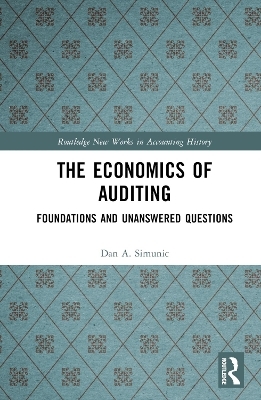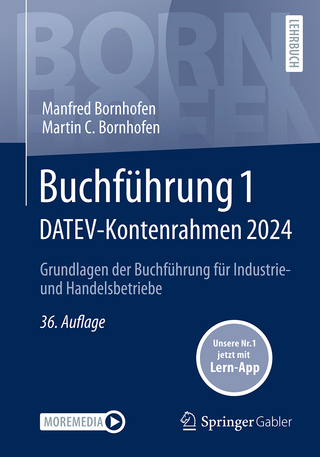
The Economics of Auditing
Foundations and Unanswered Questions
Seiten
2024
Routledge (Verlag)
978-1-032-86054-1 (ISBN)
Routledge (Verlag)
978-1-032-86054-1 (ISBN)
- Lieferbar (Termin unbekannt)
- Versandkostenfrei
- Auch auf Rechnung
- Artikel merken
This book offers a narrative commentary, along with a series of previously unpublished papers that the author presented during the 1970’s, at Accounting Research workshops at the University of Chicago, as part of his dissertation research, that ultimately led to one of the bedrock papers in the field of the economics of auditing.
The financial information provided to governments, creditors, investors etc. by businesses has been verified by auditors since ancient times. In its modern form, the independent public accounting profession has its roots in 19th century Scotland. A distinctive feature of this profession is that it consists of private for-profit businesses – operating as sole practitioners, partnerships, but mostly as large accounting firms. The question naturally arises – why should users of financial information provided by private for-profit firms place trust in the verification of that information by other private for-profit firms? This is the interesting and complex economic issue that underlies research in what has come to be called ‘the economics of auditing’. The author is one of the first researchers in this area. This book traces the development of this important stream of research that applies economic analysis to the study of financial statement audits by professional public accounting firms. It offers a narrative commentary, along with a series of previously unpublished papers that the author presented during the 1970’s, at Accounting Research workshops at the University of Chicago, as part of his dissertation research, that ultimately led to one of the bedrock papers in the field. It provides an explanation and discussion of the economic, regulatory, and research environment at that time. The book concludes with a discussion of important but currently “unanswered questions” in the field that flow from the author’s thesis research but remain unresolved. It will be of significant interest to advanced students and academics who are engaged in developing their own research programs, as well as to any researcher who is working in the area of the ‘economics of auditing’.
The financial information provided to governments, creditors, investors etc. by businesses has been verified by auditors since ancient times. In its modern form, the independent public accounting profession has its roots in 19th century Scotland. A distinctive feature of this profession is that it consists of private for-profit businesses – operating as sole practitioners, partnerships, but mostly as large accounting firms. The question naturally arises – why should users of financial information provided by private for-profit firms place trust in the verification of that information by other private for-profit firms? This is the interesting and complex economic issue that underlies research in what has come to be called ‘the economics of auditing’. The author is one of the first researchers in this area. This book traces the development of this important stream of research that applies economic analysis to the study of financial statement audits by professional public accounting firms. It offers a narrative commentary, along with a series of previously unpublished papers that the author presented during the 1970’s, at Accounting Research workshops at the University of Chicago, as part of his dissertation research, that ultimately led to one of the bedrock papers in the field. It provides an explanation and discussion of the economic, regulatory, and research environment at that time. The book concludes with a discussion of important but currently “unanswered questions” in the field that flow from the author’s thesis research but remain unresolved. It will be of significant interest to advanced students and academics who are engaged in developing their own research programs, as well as to any researcher who is working in the area of the ‘economics of auditing’.
Dan A. Simunic is Professor Emeritus in the Accounting and Information Systems Division, Sauder School of Business, The University of British Columbia, Vancouver, BC, Canada.
1. Introduction 2. The Beginning 3. The Beginning of the Middle 4. The End of the Middle 5. The Beginning of the End 6. The End 7. Epilogue 8. Unanswered Questions
| Erscheinungsdatum | 21.11.2024 |
|---|---|
| Reihe/Serie | Routledge New Works in Accounting History |
| Zusatzinfo | 45 Tables, black and white; 23 Line drawings, black and white; 23 Illustrations, black and white |
| Verlagsort | London |
| Sprache | englisch |
| Maße | 156 x 234 mm |
| Themenwelt | Wirtschaft ► Betriebswirtschaft / Management ► Rechnungswesen / Bilanzen |
| Wirtschaft ► Betriebswirtschaft / Management ► Unternehmensführung / Management | |
| Wirtschaft ► Volkswirtschaftslehre ► Mikroökonomie | |
| ISBN-10 | 1-032-86054-5 / 1032860545 |
| ISBN-13 | 978-1-032-86054-1 / 9781032860541 |
| Zustand | Neuware |
| Haben Sie eine Frage zum Produkt? |
Mehr entdecken
aus dem Bereich
aus dem Bereich
Grundlagen der Buchführung für Industrie- und Handelsbetriebe
Buch | Softcover (2024)
Springer Gabler (Verlag)
CHF 39,20
Buch | Softcover (2024)
Wiley-VCH (Verlag)
CHF 46,15


